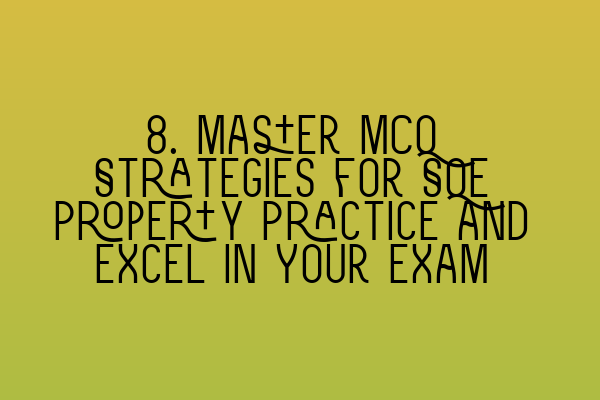Master MCQ Strategies for SQE Property Practice and Excel in Your Exam
Preparing for the SQE Property Practice exam can be a daunting task. With the amount of material you need to study and the pressure of performing well, it’s important to have a solid strategy in place. In this blog post, we will discuss 8 master MCQ strategies that will help you excel in your exam and boost your chances of success.
1. Understand the Exam Format
The first step in mastering MCQs is to understand the format of the exam. The SQE Property Practice exam consists of multiple-choice questions that assess your knowledge and application of property law concepts. Familiarize yourself with the structure of the exam and the different types of questions you may encounter.
If you want to test yourself with some practice exam questions, you can check out our article on SQE 1 Practice Exam Questions to get a feel for what to expect.
2. Study the Relevant Topics
Property law is a vast subject, and you need to have a firm grasp of the key topics that are likely to be tested. Focus on studying the essential areas such as land registration, leases, mortgages, and easements. Reviewing past exam papers can also give you an idea of the recurring themes and topics that are commonly tested.
For further guidance on preparing for the exam, you can take a look at our SQE 2 Preparation Courses and SQE 1 Preparation Courses.
3. Develop a Systematic Approach
As you read each question, develop a systematic approach for answering it. Start by reading the question carefully and identifying the key issues or concepts being tested. This will help you eliminate any irrelevant options and narrow down your choices.
When faced with complex questions, break them down into smaller parts or use diagrams to visualize the scenario. This can help you better understand the question and arrive at the correct answer.
4. Practice Time Management
Time management is crucial in the SQE Property Practice exam. Make sure to practice answering questions within the allocated time. If you find yourself spending too much time on a single question, move on and come back to it later if time permits.
Utilize practice mocks like SQE 1 Practice Mocks FLK1 FLK2 to improve your speed and efficiency in answering MCQs.
5. Use Process of Elimination
When in doubt, use the process of elimination. Start by eliminating any options that are clearly incorrect. This will increase your chances of selecting the correct answer even if you are unsure.
Be cautious not to fall into the trap of selecting an answer simply because it is the only one left. Always refer back to the question and ensure that your chosen answer aligns with the requirements.
6. Read All Options
It’s important to read all options before making a decision. Sometimes, the correct answer may not be the most obvious one. By carefully reading and considering all the options, you can make a more informed choice.
7. Pay Attention to Key Words
Key words in the question can provide valuable clues about the correct answer. Look out for keywords such as “not,” “always,” “never,” and “except.” These words can change the meaning of the question and help you select the right option.
8. Review and Learn from Mistakes
After practicing MCQs, take the time to review your answers and understand why you may have made mistakes. This will help you identify any knowledge gaps and areas that require further revision. Learning from your mistakes will enable you to improve your performance in the exam.
Finally, mark important dates in your calendar, such as the SRA SQE Exam Dates, so you can plan your revision and preparation accordingly.
In conclusion, mastering MCQ strategies is key to excelling in your SQE Property Practice exam. By understanding the exam format, studying the relevant topics, and developing a systematic approach, you can boost your chances of success. Remember to practice time management, use the process of elimination, and pay attention to key words. Additionally, always review and learn from your mistakes to continually improve your performance.
